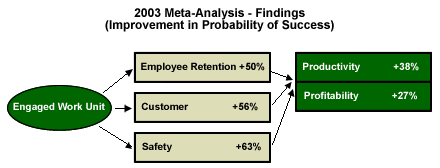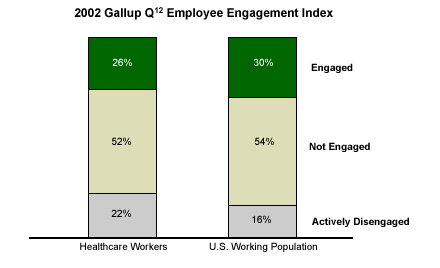Many healthcare organizations have come to use the "balanced scorecard" approach as a quality management tool. Consistent with the principles of "total quality management" that gained popularity in the late 1990s, balanced scorecards are intended to provide a set of measures that address several important perspectives -- in a hospital's case, they include patient, employee, educational, and financial measures.
Favorable scores on these measures have been difficult to maintain lately. Hospital costs are increasing. Staffing shortages in the face of increasing patient volume are chronic problems. To do more with less, hospitals must place a premium on improving productivity. But how can they accomplish this?
In our work with clients in various industries, Gallup analysts have found that many balanced scorecard measures rely on employee engagement more heavily than on any other factor. A new meta-analysis of employee engagement data from Gallup's 2002 database incorporated results from 410,225 employees in 13,751 work units, across 34 industries (including healthcare). The intent was to test for the effects of employee engagement on the following business metrics, which are frequently included in healthcare balanced scorecards:
- turnover/retention
- customer metrics (satisfaction/loyalty)
- safety
- productivity
- profitability/financial performance
The analysis found that work units in which employees' engagement levels were high have a significantly higher probability of above-average performance on each of these five metrics than work units that aren't as highly engaged.

Gallup's 2002 employee engagement database indicates that just over a quarter (26%) of healthcare workers are engaged in their jobs -- four points below the national average for the total U.S. working population. This means that only about one in four healthcare employees look forward to going to work every day, have a positive relationship with their supervisors, and feel that they are in a position in which they can best use their talents. The implications of this lack of employee engagement in the healthcare industry are serious, and will be clearly reflected on balanced scorecard reports.

How to Improve Performance on the Hospital Balanced Scorecard
What can healthcare executives in particular learn from this analysis and how can they improve their hospital's balanced scorecard performance? The answer is not as simple as just improving processes or reducing costs. The true path to success lies in people -- specifically, in improving the engagement of healthcare employees.
To begin the journey toward improving engagement among healthcare employees, here are some questions that hospital executives should ask:
- Do my employees know what their strengths are? Do the managers know their staff members' strengths?
- Do employees know what is expected of them at work? Is this what their managers expect of them?
- Do employees have the materials and equipment they need to do the job we expect of them?
- Are employees getting to do what they do best every day? Do they get to use their strengths?
When hospital managers and staff members can answer an unequivocal "yes" to each of these questions, then the hospital is more likely to be on the path to engagement.